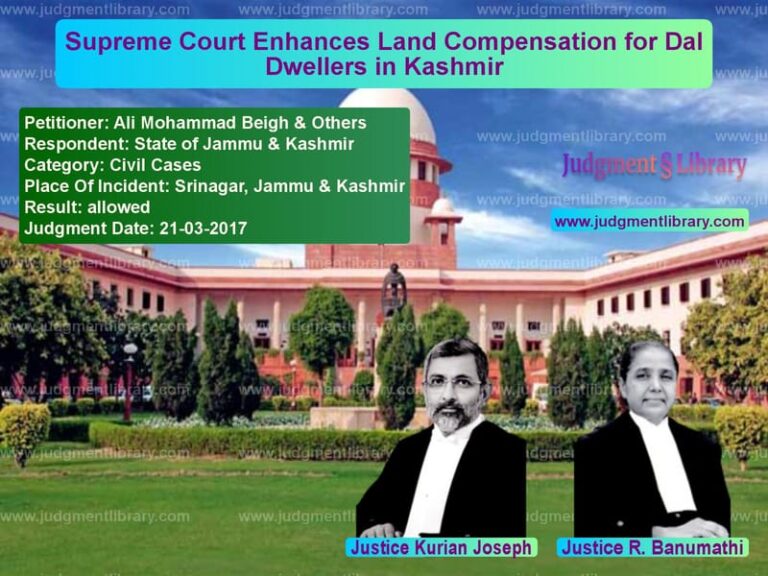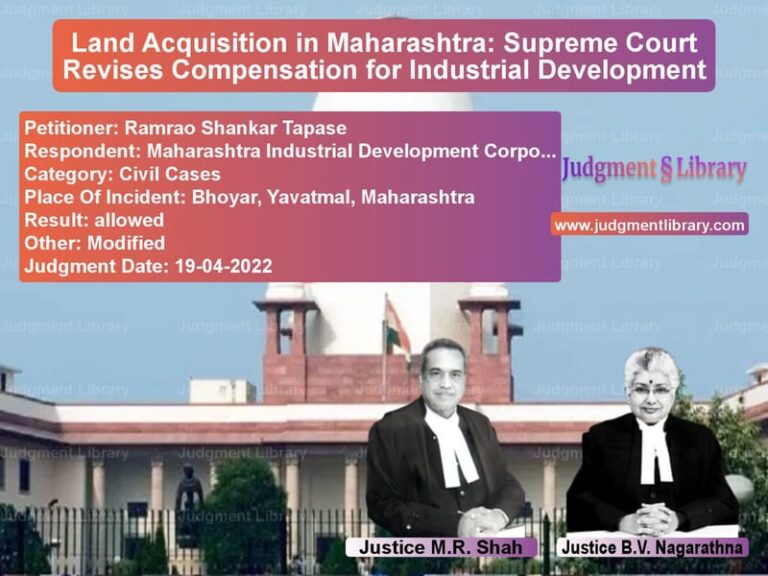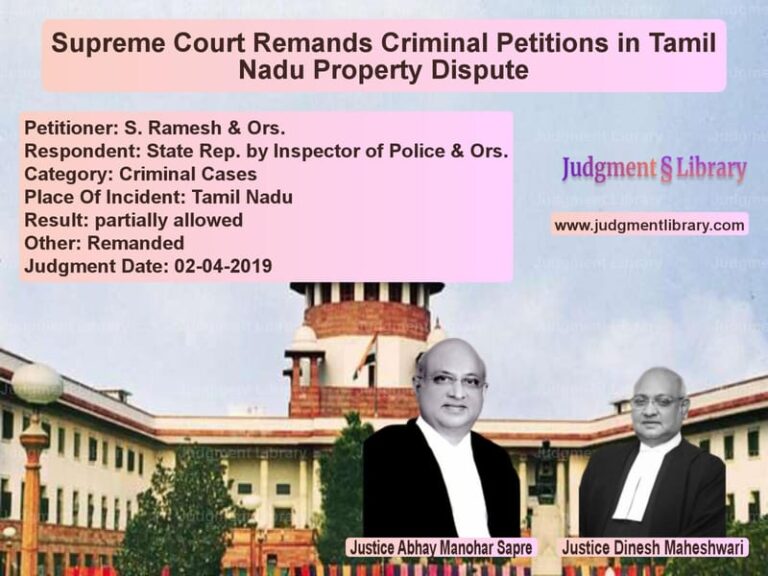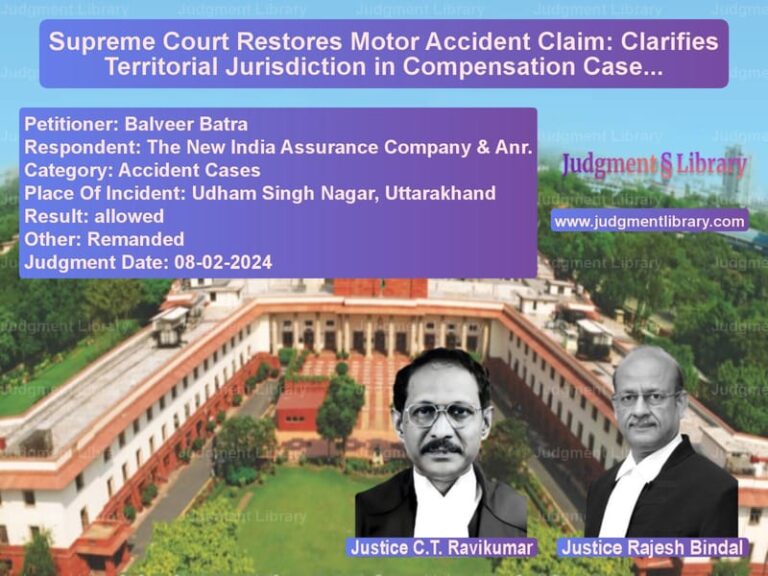Raman (Dead) by LRs v. R. Natarajan: Dispute Over Specific Performance of Agreement for Sale
The case of Raman (Dead) by LRs v. R. Natarajan involves a legal dispute concerning the specific performance of an Agreement of Sale of immovable property. The respondent, R. Natarajan, filed a suit for specific performance of an agreement for the sale of approximately 76 cents of land, which was agreed to be sold by the appellant’s father under the Agreement dated June 19, 1993. The respondent argued that the terms of the agreement had been breached and sought enforcement through specific performance, despite objections raised by the appellant’s legal representatives.
The appellant, Raman, had passed away before the case could be heard, and his legal heirs continued to represent him in the case. The suit was initially filed in 2008, and the first trial court ruled in favour of the respondent, granting specific performance. However, the first appellate court reversed the decision, and the High Court upheld the trial court’s decision. The legal heirs of the appellant then filed an appeal to the Supreme Court, contesting the High Court’s judgment.
The respondent’s claim was based on the agreement of sale dated June 19, 1993, which included various payments made to the appellant’s father over the years. According to the respondent, he had paid a total of Rs. 1,44,000, with Rs. 25,000 paid as an advance and subsequent payments made on November 19, 1995, May 11, 1998, January 27, 2001, and July 10, 2005. The respondent further claimed that the appellant’s father had agreed to allow the respondent access to the property through a pathway to be purchased from the appellant’s brother’s wife. However, the appellant’s legal heirs denied the validity of the agreement and contested the payments made by the respondent.
Read also: https://judgmentlibrary.com/supreme-court-upholds-agreement-to-sell-in-property-dispute/
The appellant’s arguments focused on the contention that the agreement was not enforceable due to a lack of proof regarding the payments and the fact that the pathway agreement with the brother’s wife had not been fulfilled. The appellant’s legal team argued that the suit was barred by limitation and that the defendant was not in breach of the agreement, as the respondent had failed to meet the terms stipulated in the contract.
The trial court, after examining the evidence, upheld the validity of the agreement and ruled in favour of the respondent, granting specific performance. However, the first appellate court disagreed with the trial court’s findings and dismissed the claim, arguing that the respondent had failed to prove the payments and that the agreement was barred by limitation. The High Court, upon reviewing the matter, set aside the decision of the first appellate court and restored the trial court’s ruling. The legal heirs of the appellant then appealed to the Supreme Court.
The main issue for consideration by the Supreme Court was whether the High Court had correctly applied the legal principles governing specific performance and limitation. The Court considered whether the respondent had proven the payment of the sale consideration and whether the suit was barred by the limitation period. The Court also examined the validity of the agreement and whether the appellant’s legal heirs were bound by the terms of the agreement executed by the deceased appellant’s father.
The Supreme Court reviewed the facts presented by both parties, including the evidence of payments made by the respondent and the failure of the appellant to meet the terms of the agreement. The Court noted that the payments made by the respondent were supported by evidence, including endorsements on the agreement. The appellant’s denial of these payments was found to be unsupported by sufficient evidence. The Court also observed that the first appellate court had erred in holding the suit to be barred by limitation, as the respondent had filed the suit within the prescribed period after the defendant’s refusal to perform the agreement.
The Court further considered the issue of whether specific performance could be enforced in a case where the agreement depended on the actions of a third party, namely the appellant’s brother’s wife, who was to sell land for the pathway. The Court acknowledged the difficulties posed by such third-party involvement but ruled that the agreement was valid and enforceable, as it had been executed by the appellant’s father. The Court emphasized that the appellant’s heirs were bound by the terms of the agreement and could not evade their obligations based on the failure of a third party to perform.
The Supreme Court ruled in favour of the respondent, confirming the High Court’s decision and directing the appellant’s legal heirs to comply with the terms of the agreement. However, the Court also recognized the appellant’s arguments regarding the pathway and the third-party involvement, and in an effort to meet the ends of justice, the Court directed the appellant’s legal heirs to pay the respondent the amount of Rs. 1,44,400, which had been paid by the respondent under the agreement, along with interest at 9% per annum from the date of the suit until the date of repayment.
The Court’s ruling on this case clarified the application of specific performance principles in situations where third-party actions were involved. The judgment reinforced the idea that legal heirs are bound by the contracts made by their predecessors, and emphasized that the principle of equity would be used to ensure that the respondent was compensated for the amounts paid under the agreement, despite the appellant’s objections.
Petitioner Name: Raman (Dead) by LRs.Respondent Name: R. Natarajan.Judgment By: Justice Indira Banerjee, Justice V. Ramasubramanian.Place Of Incident: Salem, Tamil Nadu.Judgment Date: 13-09-2022.
Don’t miss out on the full details! Download the complete judgment in PDF format below and gain valuable insights instantly!
Download Judgment: raman-(dead)-by-lrs-vs-r.-natarajan-supreme-court-of-india-judgment-dated-13-09-2022.pdf
Directly Download Judgment: Directly download this Judgment
See all petitions in Contract Disputes
See all petitions in Property Disputes
See all petitions in Succession and Wills
See all petitions in Specific Performance
See all petitions in Damages and Compensation
See all petitions in Judgment by Indira Banerjee
See all petitions in Judgment by V. Ramasubramanian
See all petitions in dismissed
See all petitions in supreme court of India judgments September 2022
See all petitions in 2022 judgments
See all posts in Civil Cases Category
See all allowed petitions in Civil Cases Category
See all Dismissed petitions in Civil Cases Category
See all partially allowed petitions in Civil Cases Category







